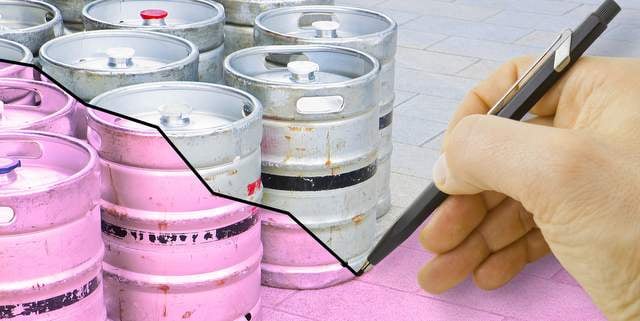
I love me that weekly TTB Newsletter. Always uplifting. In last Friday’s episode, the Alcohol and Tobacco Tax and Trade Bureau reminded alcohol makers: Booze is not healthy. Sadly, it’s true. I mean fellow CBBer Chris Crowell can hopelessly argue how beer makers might help propel customers into a healthier lifestyle (being a community center or spearheading events around exercise), but the only sport Chris plays is boccie, and that’s not what the TTB’s talking about. The collective TTB speaks:
We have found an increasing number of alcohol beverage advertisements, including company websites and social media accounts, depicting health-related statements that suggest a relationship between the consumption of an alcohol beverage and its purported health benefits or effects.
We remind industry members that the TTB advertising regulations prohibit any health-related statement that is untrue in any particular or tends to create a misleading impression as to the effects of consumption on health. For more detailed information regarding health claims and advertisements, you may review our regulations:
- Wine – 27 CFR 4.64(i)
- Distilled Spirits – 27 CFR 5.65(d)
- Malt Beverages – 27 CFR 7.54(e)
Hmmm….if the TTB is so concerned about health statements, shouldn’t beer have to include ingredients summaries like cider and seltzer? Ah, probably not. Back to dipping this burrito supreme into my beer.
If you are unsure if your alcohol advertising material is in compliance with TTB regulations, feel free to submit your advertising to the TTB for review (email on this page). For further help, I’ve embedded the malt beverages regs below, as they refer to claims of health. Read what a “health related” statement is below that. Then, probably go take a walk or something.
(2) Rules for advertising
(i) Health-related statements. In general, advertisements may not contain any health-related statement that is untrue in any particular or tends to create a misleading impression as to the effects on health of alcohol consumption. TTB will evaluate such statements on a case-by-case basis and may require as part of the health-related statement a disclaimer or some other qualifying statement to dispel any misleading impression conveyed by the health-related statement. Such disclaimer or other qualifying statement must appear as prominent as the health-related statement.
(ii) Specific health claims. A specific health claim will not be considered misleading if it is truthful and adequately substantiated by scientific or medical evidence; sufficiently detailed and qualified with respect to the categories of individuals to whom the claim applies; adequately discloses the health risks associated with both moderate and heavier levels of alcohol consumption; and outlines the categories of individuals for whom any levels of alcohol consumption may cause health risks. This information must appear as part of the specific health claim and in a manner as prominent as the specific health claim.
(iii) Health-related directional statements. A statement that directs consumers to a third party or other source for information regarding the effects on health of malt beverage or alcohol consumption is presumed misleading unless it—
- (A) Directs consumers in a neutral or other non-misleading manner to a third party or other source for balanced information regarding the effects on health of malt beverage or alcohol consumption; and
- (B)(1) Includes as part of the health-related directional statement, and in a manner as prominent as the health-related directional statement, the following disclaimer: “This statement should not encourage you to drink or increase your alcohol consumption for health reasons;” or
- (2) Includes as part of the health-related directional statement, and in a manner as prominent as the health-related directional statement, some other qualifying statement that the appropriate TTB officer finds is sufficient to dispel any misleading impression conveyed by the health-related directional statement.
(e) Health-related statements—(1) Definitions. When used in this paragraph (e), terms are defined as follows:
(i) Health-related statement means any statement related to health and includes statements of a curative or therapeutic nature that, expressly or by implication, suggest a relationship between the consumption of alcohol, malt beverages, or any substance found within the malt beverage, and health benefits or effects on health. The term includes both specific health claims and general references to alleged health benefits or effects on health associated with the consumption of alcohol, malt beverages, or any substance found within the malt beverage, as well as health-related directional statements. The term also includes statements and claims that imply that a physical or psychological sensation results from consuming the malt beverage, as well as statements and claims of nutritional value (e.g., statements of vitamin content). Statements concerning caloric, carbohydrate, protein, and fat content do not constitute nutritional claims about the product.
(ii) Specific health claim is a type of health-related statement that, expressly or by implication, characterizes the relationship of the malt beverage, alcohol, or any substance found within the malt beverage, to a disease or health-related condition. Implied specific health claims include statements, symbols, vignettes, or other forms of communication that suggest, within the context in which they are presented, that a relationship exists between malt beverages, alcohol, or any substance found within the malt beverage, and a disease or health-related condition.
(iii) Health-related directional statement is a type of health-related statement that directs or refers consumers to a third party or other source for information regarding the effects on health of malt beverage or alcohol consumption.





Leave a Reply
You must be logged in to post a comment.